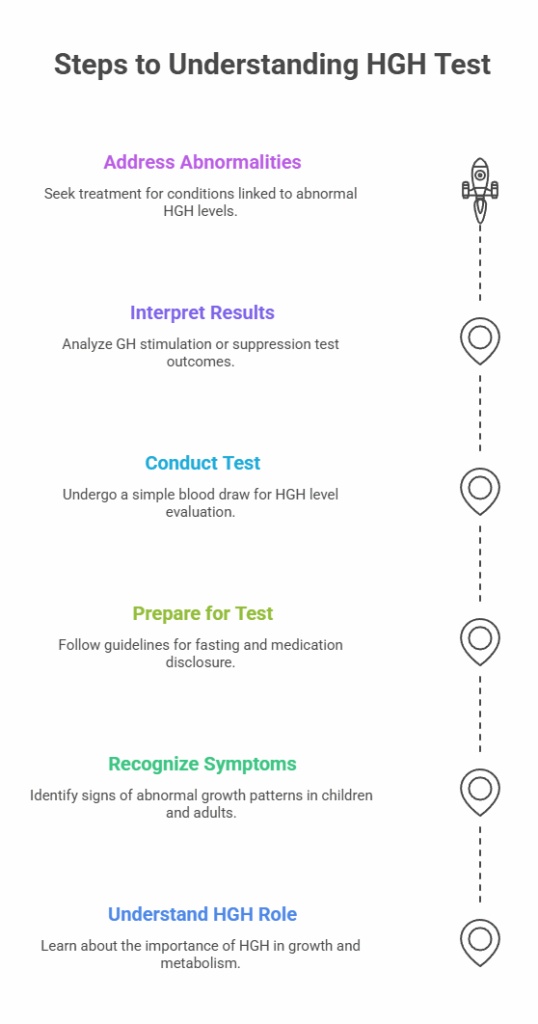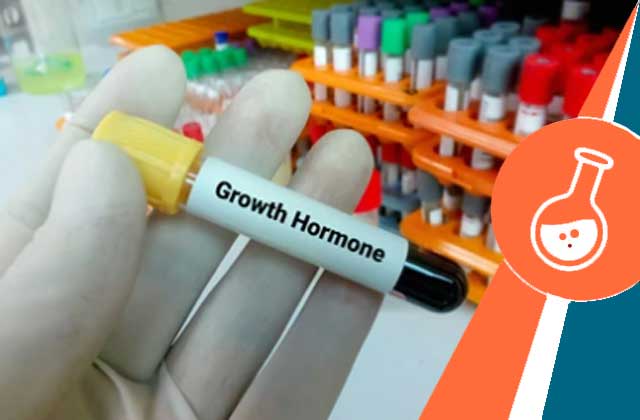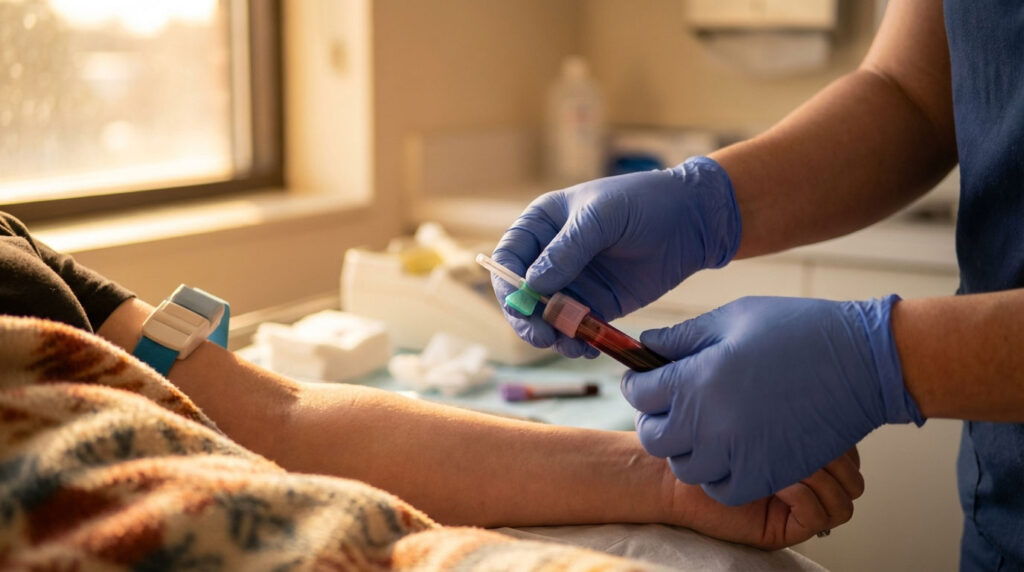
What is Growth Hormone Test (HGH)?
Growth hormone test involve blood assessments aimed at determining whether your body is producing an adequate level of GH, also referred to as human growth hormone. GH plays a pivotal role in regulating bodily growth and metabolism, influencing how your body utilizes food and energy. Produced within the pituitary gland situated at the base of the brain, GH coordinates crucial functions essential for overall health and development1.
It is also responsible for maintaining bone mineral density in adults. Thus, its deficiency or excess may cause a series of clinical problems in both adults and children.
About Growth Hormone Test
Learn everything about the growth hormone test, before you book a lab test online. Understand the why, how, and what of this test.
What Does the Growth Hormone Blood Test Measure?
The growth hormone test helps to measure the level of growth hormone in the body. In addition to GH, other mediators of growth, like insulin-like growth factors, may also be quantified in some cases.
Identifying Growth-Related Disorders
The GH test plays a vital role in diagnosing various GH-related disorders, which can have significant implications for both children and adults 2:
- Gigantism: A rare disorder in children characterized by excessive production of GH. It results in abnormally high growth, including very tall stature and disproportionately large hands and feet, compared to children of the same age.
- Acromegaly: This adult disorder is caused by an overproduction of growth hormone, leading to the thickening of bones and the enlargement of hands, feet, and facial features. Acromegaly is often a progressive condition with significant health implications.
- GH Deficiency: GH is vital for typical growth and development in children. A GH deficiency can result in slower growth and shorter stature compared to peers of the same age. In adults, a shortage of GH may contribute to decreased bone density and diminished muscle mass.
Why Do Doctors Recommend a Growth Hormone Test?
A physician may recommend an HGH test in the following case scenarios: 3
- Children:
For children, symptoms pointing to GH deficiency include markedly slower growth compared to peers, resulting in a notably shorter stature, reduced growth in arms and legs, and, in boys, underdeveloped genitalia.
Delayed puberty is also a common sign. In contrast, symptoms of GH excess, leading to gigantism, encompass rapid growth, leading to an unusually tall stature for age, an oversized head, and larger hands and feet, often accompanied by mild to moderate obesity.
- Adults:
In adults, GH deficiency may manifest as fatigue, decreased bone density, and reduced muscle mass, although such symptoms are less commonly attributed solely to GH deficiency and thus less frequently prompt GH testing.Excess GH in adults, characteristic of acromegaly, results in coarser facial features, enlarged lips, nose, and tongue, a deeper voice, excessive sweating, thickened skin, and in women, irregular menstrual cycles, and erectile dysfunction In men.
How To Prepare For Human Growth Hormone Test?
The steps below help you ensure that your Human Growth Hormone test provides the most accurate information about your health.
- Fasting requirements: The HGH test requires fasting for a certain time before the test. Follow the doctor’s instructions regarding the duration of fasting for the correct result.
- Medication guidelines: Tell your healthcare provider about all the drugs, supplements or herbal remedies you are taking, as some substances may affect test results. Follow any specific instructions regarding drug adjustment before testing.
- Contact to doctor: Share your entire medical history with existing conditions or symptoms to help explain test results.
What Happens During Human Growth Hormone Testing?
An Human Growth Hormone Test only takes a few minutes.
- As per the scheduled time of the blood test, a Lab Technician who usually takes blood samples will arrive.
- A thin needle will be used to draw blood from your arm’s vein.
- The needle might cause a mild pinch and some discomfort.
- The lab technician then fills a collection tube with blood and then removes the needle from the skin.
- They place a small bandage on the arm
Please note: There might be slight pain or bruising at the spot of insertion, but most of the symptoms go away quickly.
Finding Human Growth Hormone Test
Should you book blood test online to check your health condition or go to the nearest clinic and get it done by a medical professional? Let’s Find Out
Can I Take a Human Growth Hormone Test At Home?
Yes, the Human Growth Hormone Test can be taken at home. HealthcareOnTime’s at-home lab testing service, in association with thyrocare, provides a convenient and efficient way to get blood testing done from the comfort of your own home without the need for a doctor’s visit or a trip to a lab. It’s important to note that it’s always a good idea to consult with an expert healthcare provider about any queries you may have about your test results.
How Much Does Human Growth Hormone Test Cost?
The Human Growth Hormone test price varies significantly depending on many factors:
- Location: The Human Growth Hormone test prices in India may vary depending on the city or the region in which the test is conducted. For example, in Bangalore or Mumbai, it might be expensive as compared to small towns.
- Type of facility centres: The Human Growth Hormone test charge also varies between private hospitals, government hospitals, and diagnostic centres. Cost is lower in government hospitals as compared to private ones.
- Healthcare centres: Diagnostic centres, laboratories and hospitals may have different Human Growth Hormone test prices. It depends upon the benefits and reputation of the healthcare centre.
- Insurance Coverage: Individuals with health insurance can cover partial or all costs depending on their policy coverage and network providers.
- Additional services: Additional services such as home sample collection, express test results, or additional charges for special management may be paid, which contributes to the overall Human Growth Hormone test price.
Generally, the Human Growth Hormone test cost in India ranges from Rs. 500 to Rs. 2000. By opting for HealthcareOnTime lab test at-home facilities, you can access the Human Growth Hormone test at the cost of INR 500.
Test Results Interpretation
You received your growth hormone test results but still need help determining if they fall under the normal range? Read this section to know if your results range between the GH normal range.
What do Growth Hormone Test Results Mean?
Growth hormone tests are generally done via GH suppression and GH stimulation tests. Their interpretation is as follows:
- GH Stimulation Test: This test assesses the body’s ability to produce GH. A lack of increase in GH levels upon stimulation, especially when symptoms suggest a deficiency, points towards a potential GH deficiency. However, it’s crucial to exclude thyroid disorders as they can present similarly. This is because thyroid disorders can affect GH levels and the body’s response to GH stimulation.
- GH Suppression Test: This test is used to determine if there’s an excess of GH production. If GH levels do not decrease following suppression, it suggests an abnormal excess of GH. Such results could lead a healthcare provider to order further investigations, such as an MRI scan, to check for a mass or tumor in the pituitary gland, which might be causing elevated GH levels.
Implications of Abnormal GH Levels:
- Higher GH Levels: May indicate conditions such as acromegaly in adults or gigantism in children. It can also suggest the presence of a noncancerous tumor in the pituitary gland.4
- Lower GH Levels: Suggests possible growth hormone deficiency or hypopituitarism, and similarly, may indicate a noncancerous pituitary gland tumor.
- Additional Factors: Both higher and lower GH levels could be influenced by chronic malnutrition, liver cirrhosis, stress from surgery, or serious infections.
What is GH Normal Range?
The levels of growth hormone vary in accordance with age and gender, the normal GH levels by age are tabulated below:5
Age group | Normal growth hormone range (in nanograms/ milliliter) |
Adult males at birth | 0.4-10 |
Adult females at birth | 1-14 |
Children | 10-50 |
What Medical Conditions Can Cause High GH Levels?
The following conditions can make an individual’s GH levels go beyond the growth hormone normal levels:
- Acromegaly- most common cause for high GH levels in adults
- Pituitary adenomas6
- Multiple endocrine neoplasias- an extremely rare familial cause of GH excess
- McCune Albright syndrome- causes irregular functioning of GH-producing glands.7
What Medical Conditions Can Cause Low GH Levels?
The following conditions are due to low GH and can be identified using a growth hormone deficiency test:8
Congenital Growth Hormone Deficiency (GHD): Results from genetic mutations and may be linked with structural brain issues or midline facial abnormalities. Specific types include:
- Type IA: Characterized by slowed fetal growth and development of antibodies against synthetic GH, leading to very short stature.
- Type IB: Presents with some natural GH at birth, with ongoing response to synthetic GH treatment.
- Type II: Associated with very low levels of GH and short stature, evident in early to mid-childhood, often with pituitary hypoplasia.
- Type III: Similar to Type II, with very low GH levels and short stature, plus a weakened immune system.
Acquired Growth Hormone Deficiency (GHD): Occurs due to damage to the pituitary gland from:
- Pituitary adenoma: A benign tumor.
- Radiation therapy: Particularly if targeted near the pituitary gland.
- Traumatic Brain Injury (TBI): Severe head injury can affect pituitary function.
- Impaired blood flow: To the pituitary gland.
- Surgical damage: Accidental damage from surgeries, including removal of a pituitary adenoma.
- Central nervous system infections and infiltrative diseases, such as Langerhans cell histiocytosis, sarcoidosis, and tuberculosis.
- Hypothalamus tumors exert pressure on the pituitary gland.
More Related Tests
Why To Book with HealthCareOnTime

17 Crores+ Samples Processed

World Class Technology Labs

25+ Years of Trust & Experience











